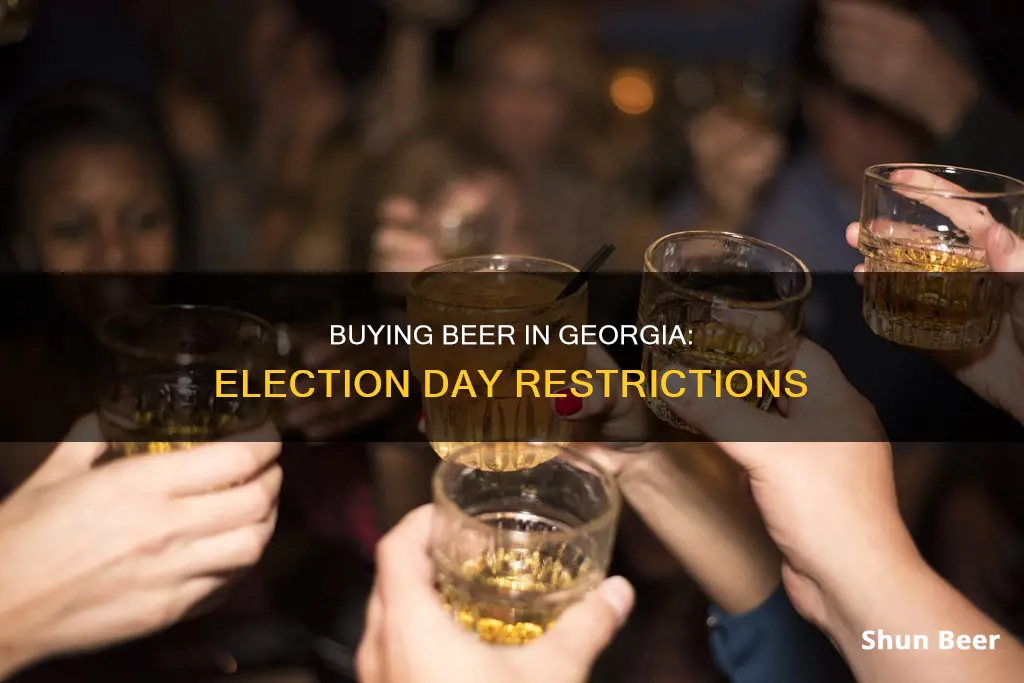
In the United States, an old law prohibits citizens from buying alcohol on election day. This law is still active in certain parts of the country, including some areas in Alaska, Massachusetts, and Puerto Rico. However, in Georgia, a new House bill that went into effect on July 1, 2023, allows the sale of alcoholic beverages on election days. This bill was designed as an amendment to the previous Code Section 3-3-20 of the Official Code of Georgia Annotated, which prohibited the sale of alcohol between 7 a.m. and 7 p.m. on election days. While local governments in Georgia have the authority to override the bill and make the sale of alcohol illegal in their counties, the new bill provides citizens with more flexibility regarding alcohol purchases on election days.
| Characteristics | Values |
|---|---|
| Alcohol sale on election days | Legal, unless prohibited by the local governing authority of the county or municipality |
| Alcohol sale on Sundays | Illegal |
| Alcohol sale on Christmas Day | May be prohibited by the local governing authority of the county or municipality |
What You'll Learn

Alcohol sales on Sundays in Georgia
Georgia's alcohol laws have undergone significant changes in the last decade, including the legalization of alcohol sales on Sundays.
Until 2011, the sale of alcohol on Sundays was prohibited in Georgia. However, in recent years, there have been notable amendments to the state's alcohol regulations. In 2011, Georgia voters approved a measure to permit alcohol sales in more than 100 cities and counties across the state on Sundays. This decision was supported by the Georgia Association of Convenience Stores, who advocated for giving voters a choice in the matter. Despite opposition from some liquor store owners and the Georgia Christian Coalition, the referendum passed with overwhelming support in certain cities, such as Atlanta.
Subsequently, in 2014, Governor Nathan Deal signed a bill into law that allowed Sunday alcohol sales in bars on St. Patrick's Day and the Sundays leading up to the holiday. This legislation was originally proposed by congressmen from Savannah, a city that attracts many tourists for St. Patrick's Day celebrations.
The most recent development in Georgia's alcohol laws is the passage of the Brunch Bill, also known as the Mimosa Mandate, which allows restaurants to serve alcohol as early as 11 a.m. on Sundays. Prior to this legislation, it was illegal to serve alcohol before 12:30 p.m. on Sundays. However, it is important to note that the Mimosa Mandate only applies to restaurants and wineries, and grocery and convenience stores are still prohibited from selling alcohol on Sundays before 12:30 p.m.
While Georgia has made strides in relaxing its alcohol laws, it still has a complex regulatory landscape. The state's geographic location in the Bible Belt has influenced its conservative cultural expression, including its alcohol laws. Additionally, Georgia's alcohol industry operates within a three-tier system, where alcohol producers can only sell to wholesalers, who then sell to retailers, the only entities that can sell to individual customers. This system has been criticized for making alcohol more expensive and harder to obtain, as well as hindering market innovation.
In summary, while Georgia has taken steps towards modernizing its alcohol laws, including allowing Sunday sales and earlier serving times on Sundays, the state still has a complex regulatory environment for alcohol, with individual counties having their own unique rules.
Buying Beer on Easter Sunday in Tennessee: What's Allowed?
You may want to see also

Alcohol sales on Election Days in Georgia
In Georgia, it is now legal to buy alcohol on Election Day due to a new House bill that went into effect on July 1. This bill, an amendment to Code Section 3-3-20 of the Official Code of Georgia Annotated, removed the previous restriction on selling alcohol between 7 a.m. and 7 p.m. on Election Days. The bill states that "in any county or municipality in which the sale of alcoholic beverages is authorized, the sale of alcoholic beverages in compliance with such authorization shall be authorized and legal on any election day." However, local governments have the authority to override this bill and make the sale of alcohol illegal in their counties by filing a county ordinance.
The bill's sponsors, including Republican House Representative Anne Mueller, argued that citizens were still showing up to the polls drunk, so limiting alcohol sales didn't solve anything. Mueller also pointed out that those who wanted to drink on Election Day could simply stock up on alcohol beforehand.
Prior to this bill, there had been a trend among states to repeal laws restricting alcohol sales on Election Day. Maryland was the first state to establish an Election Day alcohol ban in 1811, but as of January 2023, only certain parts of the United States, including some jurisdictions in Alaska and parts of Puerto Rico and Massachusetts, still had Election Day dry laws in place.
In addition to the recent change in alcohol sales on Election Days, Georgia has also made other updates to its alcohol laws in recent years. In 2011, voters in more than 100 cities and counties across Georgia approved alcohol retail sales on Sundays, and in 2018, the city of Atlanta passed a Brunch Bill, allowing restaurants to serve alcoholic beverages on Sunday mornings starting at 11 a.m.
German Beer: Where to Buy the Best Brews
You may want to see also

Alcohol sales on Christmas Day in Georgia
In the state of Georgia, the sale of alcohol is generally prohibited on Christmas Day. However, municipalities with a population of 400,000 or more residents can decide to allow Christmas Day alcohol sales after 12:30 pm. This decision-making power is in line with the state's broader approach to alcohol regulation, which gives individual counties a significant amount of control.
The authority to prohibit the sale of alcoholic beverages on Christmas Day lies with the governing body of each county or municipality. They may do so by passing an ordinance or resolution. This means that the rules around alcohol sales on Christmas Day can vary from one area to another within Georgia, and it is essential to check the specific regulations in your county or municipality.
The laws regarding alcohol sales on Christmas Day in Georgia are subject to change, and it is always a good idea to refer to the most recent version of the Georgia Code or check with local authorities for the most up-to-date information.
Stone Cold Beer: Where to Buy Austin's Brew
You may want to see also

History of alcohol sales restrictions in Georgia
Georgia has had a long and complex history with alcohol sales restrictions. The state has gone through periods of prohibition and the relaxation of alcohol laws, with some restrictions still in place today.
Efforts to restrict alcohol consumption in Georgia began as early as the colonial era. In 1735, the Trustees, the governing body of the colony of Georgia, issued a decree prohibiting the sale of strong liquor to curb public drunkenness among colonists and Native Americans. However, this law was overturned just seven years later due to protests from merchants who argued that it harmed the colony's trade.
In the early 19th century, temperance advocates, including the Georgia State Temperance Society established in 1828, continued to push for restrictions on alcohol sales with limited success. It wasn't until the 1870s that reformers achieved more significant victories, including the elimination of alcohol sales on election days, the imposition of an annual state tax on liquor dealers, and the prohibition of liquor consumption in gambling establishments.
The Woman's Christian Temperance Union (WCTU), which formed its first Georgia chapter in 1880, played a crucial role in the temperance movement. In 1881, at the behest of the WCTU's Georgia chapter, a local option law was presented to the state legislature by William J. Northen of Hancock County. This proposed bill allowed localities to vote for or against the sale of liquor if one-tenth of registered voters in a county signed a petition. Despite opposition from commercial shipping centres and critics who argued that existing licensing fees were sufficient, the Georgia legislature passed the General Local Option Liquor Law in 1885. While this law did not prohibit the manufacture or sale of local wines, ciders, or medicinal and sacramental alcohol, it gave voters the power to prohibit liquor sales at the local level.
In 1907, Georgia became the first southern state to pass a statewide ban on the production, transportation, and sale of alcohol. This prohibition lasted until 1935, two years after the repeal of the Eighteenth Amendment and the end of national prohibition. However, even after the repeal of statewide prohibition, "blue laws," designed to enforce religious standards, placed some restrictions on alcohol sales in Georgia.
In recent years, Georgia has made significant changes to its alcohol laws. In 2011, Governor Nathan Deal signed a bill allowing communities to vote for the first time on the question of Sunday alcohol sales at convenience and package stores. This marked a major shift, as Georgia was the last southern state with a "blue law" banning Sunday sales.
During the COVID-19 pandemic, the state government implemented additional changes to alcohol policies to support the struggling restaurant industry. A bill was signed into law in 2021, allowing restaurants to sell to-go cocktails with a maximum of two alcoholic beverages per entree, provided they are sold in sealed containers and placed in the glove box or trunk of the customer's car during transport.
While Georgia has relaxed many of its alcohol sales restrictions over time, some counties in the state continue to have dry laws, completely prohibiting the retail sale of liquor. Additionally, individual counties are allowed to set the days and time frames for alcohol sales, though sales before 8 a.m. or after 11:45 p.m. from Monday to Saturday are not permitted.
Where to Buy a Keg of Beer?
You may want to see also

Alcohol sales in Athens-Clarke County, Georgia
On Sundays, the sale of alcoholic beverages in Athens-Clarke County is allowed from 12:30 p.m. to 12:00 a.m. in licensed restaurants and establishments that derive at least 50% of their total annual gross income from the rental of rooms for overnight lodging. The "Brunch Bill," approved by Georgia voters, allows businesses in the county to serve alcohol starting at 11:00 a.m. on Sundays, instead of the previous time of 12:30 p.m. This change is expected to boost morning business for brunch spots in the area.
In addition to the county regulations, alcoholic beverage sales in Georgia are also governed by state laws. While the sale of alcohol on Sundays was previously prohibited in the state, Georgia voters approved retail sales on Sundays in over 100 cities and counties in 2011. However, each jurisdiction can make its own decision through a referendum. As of 2023, Georgia law allows the local governing authority of any county or municipality to prohibit the sale of alcoholic beverages on election days by ordinance. This prohibition can be implemented within the territorial boundaries for which the election is held.
Athens-Clarke County has approximately 325 licensed alcohol establishments, and businesses must obtain both a county and a state alcohol license to operate. The application process for alcohol licenses is managed by the county's Finance Department and can be done through the Georgia Tax Center.
Buying Beer at Massachusetts Gas Stations: What's the Deal?
You may want to see also
Frequently asked questions
Yes, you can. A new House bill that went into effect on July 1, 2023, allows the sale of alcohol on election days. However, local governments can override this bill and make it illegal in their counties if they file a county ordinance.
The bill amends Code Section 3-3-20 of the Official Code of Georgia Annotated, which previously made it illegal to sell alcohol between 7 a.m. and 7 p.m. on Election Day.
Republican House Representative Anne Mueller, one of the bill's co-sponsors, stated that citizens were still coming to the polls drunk, so limiting the sale of alcohol didn't solve anything.
Yes, as of January 2023, parts of Puerto Rico, certain jurisdictions in Alaska, and some parts of Massachusetts have Election Day dry laws in place.







